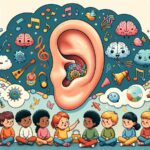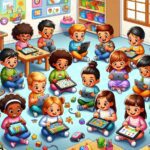Learning disabilities in children can be a challenging journey for many parents, especially new ones trying to navigate the complexities of their child’s development. A learning disability is a neurological disorder that affects the brain’s ability to receive, process, and respond to information. It can impact a child’s ability to read, write, speak, do math, and other academic tasks. This guide aims to provide valuable insights into learning disabilities, ensuring parents have the knowledge to support their child effectively.
What are Learning Disabilities?
Learning disabilities are neurodevelopmental disorders that can cause difficulties with cognitive skills such as reading, writing, math, reasoning, and processing information. They are not indicative of intelligence levels; rather, they reflect the diverse ways in which brains process information. Common types include Dyslexia, Dyscalculia, Dysgraphia, and Processing Deficits. It’s crucial for parents to understand that with the right support and interventions, children with learning disabilities can achieve academic success and lead fulfilling lives.
For further understanding, the Understood.org provides comprehensive resources on various types of learning disabilities, their signs, and intervention strategies.
How to Recognize Learning Disabilities in Your Child
Recognizing learning disabilities early can significantly impact your child’s educational journey. Signs may vary widely depending on the age of your child and the type of disability. Common indicators include difficulty following directions, poor memory, challenges in reading or writing, struggles with math concepts, and difficulties with attention or organization. It’s important to note that early detection and intervention can make a substantial difference in managing these challenges.
Parents concerned about their child’s development should consult with pediatric specialists who can conduct assessments and offer guidance. Early intervention programs are beneficial in addressing learning disabilities, providing strategies and accommodations to support the child’s learning processes.
Supporting Your Child with Learning Disabilities
Supporting a child with learning disabilities requires patience, understanding, and proactive strategies. It involves working closely with educators to develop an Individualized Education Program (IEP) that outlines specific accommodations and interventions tailored to your child’s needs. Additionally, nurturing a positive home learning environment is crucial. This includes setting aside time for reading, engaging in educational activities, and fostering your child’s strengths and interests.
Furthermore, utilizing resources such as specialized tutoring, speech therapy, and occupational therapy can be immensely beneficial. It’s also essential for parents to build a network of support, connecting with other families navigating similar challenges through support groups or online communities.
Resources and Further Reading
There are numerous resources available for parents and caregivers of children with learning disabilities. Organizations such as the LD Online and the National Center for Learning Disabilities offer a wealth of information, including articles, tools, and advocacy tips. Additionally, books like ‘The Dyslexia Empowerment Plan’ and ‘Overcoming Dyslexia’ provide practical advice and insights for supporting children with specific learning disabilities.
For hands-on support, consider reaching out to local educational consultants or special education advocates who can guide you in navigating school systems and accessing the services your child needs.
Understanding and supporting children with learning disabilities is a journey filled with challenges and rewards. By staying informed, seeking professional guidance, and fostering a supportive environment, parents can empower their children to overcome obstacles and thrive academically and personally. Remember, recognizing the signs early and taking proactive steps can make a significant difference in your child’s development and self-esteem.
For more information related to children’s health and development, explore our other articles on Autism, Developmental Milestones, and Cognitive Development.













